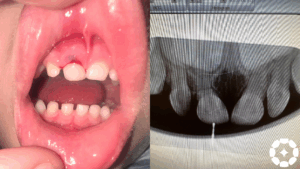At Paschke Dental Group, we believe that dental care is not just about having a beautiful smile; it’s about fostering overall well-being. Oral health is intricately connected to various aspects of physical and mental health, forming an essential part of a person’s overall wellness. However, maintaining oral health can be challenging, especially for those grappling with mental health issues. This is why we at Paschke Dental Group approach every patient with a nonjudgmental, compassionate attitude, ensuring that everyone feels supported and cared for, no matter where they are on their health journey.
The Link Between Oral Health and Physical Health
Oral health is often considered a window into the body’s overall health. The mouth is home to a complex ecosystem of bacteria, most of which are harmless or even beneficial. However, poor oral hygiene can lead to the buildup of harmful bacteria, causing infections that can spread beyond the mouth. Conditions like periodontitis (a severe gum infection) are not just confined to the oral cavity—they can have serious implications for other parts of the body.
Cardiovascular Health: Research has shown that periodontal disease is linked to heart disease. The inflammation caused by periodontitis can increase the risk of atherosclerosis (hardening of the arteries), leading to cardiovascular problems such as heart attacks and strokes. This connection underscores the importance of maintaining good oral hygiene as part of a holistic approach to preventing heart disease.
Diabetes: There is a bidirectional relationship between diabetes and periodontal disease. People with diabetes are more prone to infections, including gum disease, and severe gum disease can make it more difficult to control blood sugar levels. Managing oral health is therefore crucial for managing diabetes and preventing its complications.
Respiratory Infections: Bacteria from periodontal infections can be inhaled into the lungs, leading to respiratory infections such as pneumonia. This risk is particularly significant for older adults and those with compromised immune systems.
These examples illustrate that oral health is not just about preventing cavities or having fresh breath—it is a vital component of overall physical health.
The Role of Mental Health in Oral Health
Mental health significantly impacts an individual’s ability to maintain oral hygiene and seek dental care. Depression, anxiety, and other mental health conditions can reduce motivation and energy, leading to neglect of daily oral hygiene practices like brushing and flossing. Additionally, some mental health conditions or the medications used to treat them can cause dry mouth, a condition that increases the risk of tooth decay and gum disease.
Depression and Oral Health: Depression can lead to a lack of interest in self-care, including oral hygiene. People experiencing depression may neglect brushing and flossing, skip dental appointments, or engage in unhealthy behaviors such as smoking or consuming sugary foods, all of which can harm oral health. Moreover, the stress associated with depression can exacerbate conditions like bruxism (teeth grinding), leading to tooth damage and jaw pain.
Anxiety and Dental Phobia: Anxiety can manifest in various ways that impact oral health. Dental anxiety or phobia is a common issue that prevents individuals from seeking regular dental care, often leading to the progression of dental problems that could have been addressed with early intervention. For some, the mere thought of visiting a dentist can cause extreme stress, resulting in avoidance behaviors that allow minor oral health issues to escalate.
Paschke Dental Group’s Nonjudgmental Approach
At Paschke Dental Group, we understand the profound connection between mental health and oral health. We recognize that taking care of your teeth and gums can be overwhelming, especially when you are struggling with mental health challenges. Our goal is to provide a safe, supportive environment where you can receive the care you need without fear of judgment.
Compassionate Care: Our team is trained to approach each patient with empathy and understanding. We take the time to listen to your concerns, whether they are related to your oral health or your mental well-being. We understand that life can be challenging and that dental care may not always be a top priority. Our aim is to help you get back on track in a way that feels manageable and comfortable for you.
Creating a Calming Environment: We know that the dental office can be a source of anxiety for many people. To help alleviate this, we have designed our practice to be as welcoming and calming as possible. From the moment you step through our doors, you will notice an environment that prioritizes your comfort. Our staff is friendly and approachable, and we offer amenities like soothing music, comfortable seating, and gentle lighting to create a relaxing atmosphere.
Open Communication: We believe that open communication is key to providing effective dental care, especially for those dealing with mental health challenges. We encourage you to share any concerns or anxieties you may have so that we can tailor our approach to meet your needs. Whether you need extra time during your appointment, prefer certain communication methods, or have specific triggers we should be aware of, we are here to listen and accommodate.
Flexible Treatment Plans: Understanding that each patient’s situation is unique, we offer flexible treatment plans that can be adjusted to fit your needs and circumstances. If you are struggling to maintain regular appointments due to mental health challenges, we can work with you to create a schedule that is less overwhelming. We also offer options for sedation dentistry if anxiety makes it difficult for you to undergo dental procedures.
How Paschke Dental Group Supports Mental Health Through Oral Care
At Paschke Dental Group, we are committed to being more than just your dental care providers. We see ourselves as partners in your overall health journey, supporting you in taking care of your oral health in a way that also nurtures your mental well-being.
Encouraging Positive Oral Habits: We offer guidance on how to develop and maintain positive oral hygiene habits, even when mental health challenges make it difficult. This includes providing practical tips on how to integrate oral care into your daily routine, recommending products that are easy to use and effective, and encouraging small, manageable steps that lead to lasting improvements in your oral health.
Promoting Self-Care: We emphasize the importance of self-care in all aspects of life, including oral health. Taking care of your teeth and gums is a form of self-care that can have a positive impact on your overall well-being. We encourage our patients to view dental care as an act of kindness towards themselves, a way of investing in their health and happiness.
Offering Resources and Support: We understand that mental health challenges can be isolating. At Paschke Dental Group, we strive to be a source of support for our patients. We can provide resources and referrals to mental health professionals if needed, and we are always here to offer encouragement and understanding.
The Impact of Oral Health on Mental Well-being
Just as mental health affects oral health, the reverse is also true: poor oral health can have a significant impact on mental well-being. Dental problems can cause pain, discomfort, and embarrassment, leading to a decrease in self-esteem and confidence. This can affect social interactions, relationships, and overall quality of life.
Pain and Discomfort: Chronic dental pain, such as that caused by untreated cavities or gum disease, can lead to significant distress and affect a person’s ability to focus, sleep, and perform daily tasks. This ongoing discomfort can contribute to feelings of frustration, helplessness, and even depression.
Self-Esteem and Confidence: The appearance of one’s teeth plays a crucial role in self-esteem. Issues like missing teeth, discolored teeth, or crooked smiles can make people feel self-conscious, leading to social withdrawal and a decrease in overall confidence. This, in turn, can exacerbate mental health conditions such as anxiety and depression.
Social Interaction: Oral health issues can affect how individuals interact with others. Bad breath, visible dental problems, or the fear of judgment due to poor oral health can make social situations stressful. Over time, this can lead to isolation, loneliness, and further mental health decline.
At Paschke Dental Group, we are dedicated to helping our patients overcome these challenges. We offer a range of cosmetic and restorative dental treatments designed to enhance your smile and boost your confidence. Our goal is to help you feel proud of your smile and to empower you to engage fully in life, free from the limitations imposed by poor oral health.
Conclusion: A Holistic Approach to Health
At Paschke Dental Group, we believe that oral health is a critical component of overall well-being. We understand the challenges that mental health issues can pose to maintaining good oral hygiene and seeking regular dental care. That’s why we are committed to providing compassionate, nonjudgmental care that supports both your oral health and your mental well-being.
We invite you to take the first step towards a healthier, happier life by prioritizing your oral health. Whether you are dealing with mental health challenges or simply looking to improve your dental care routine, Paschke Dental Group is here to support you every step of the way. Together, we can achieve not only a healthier smile but also a better quality of life.








